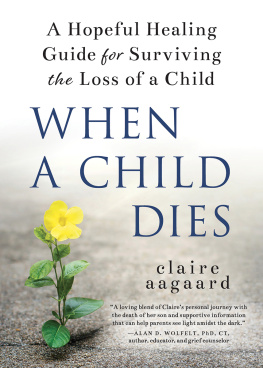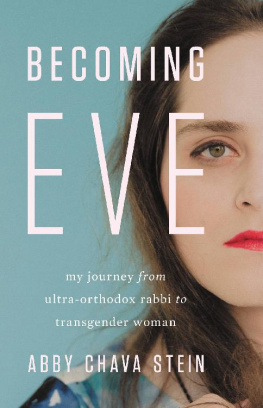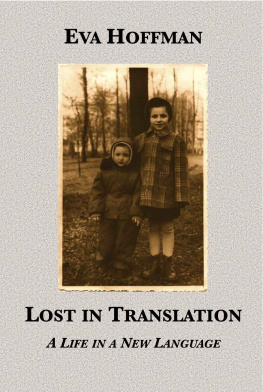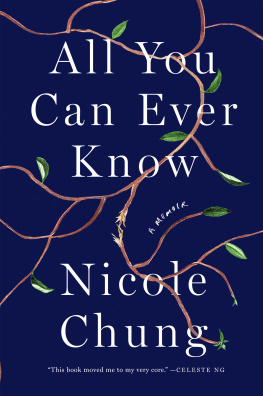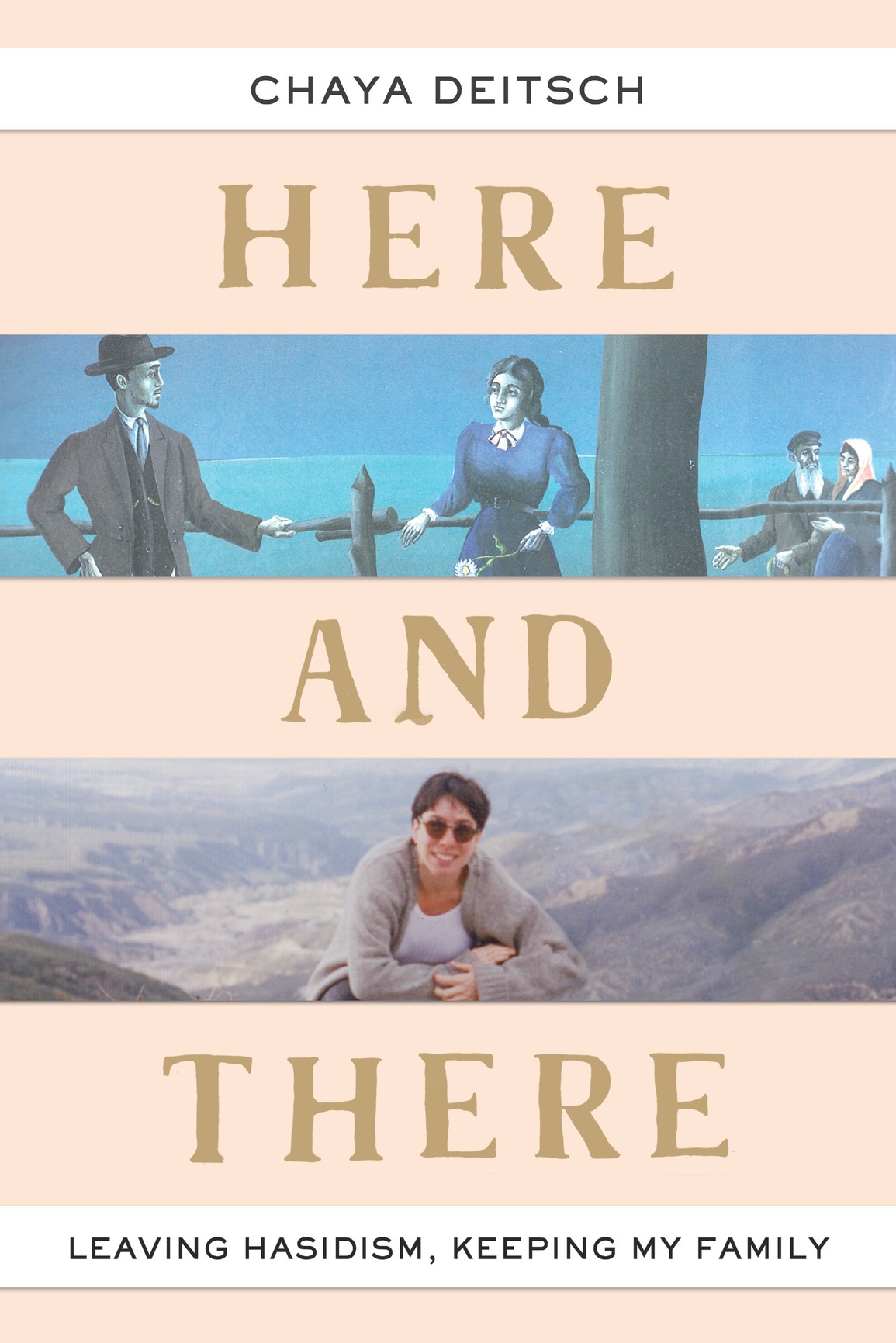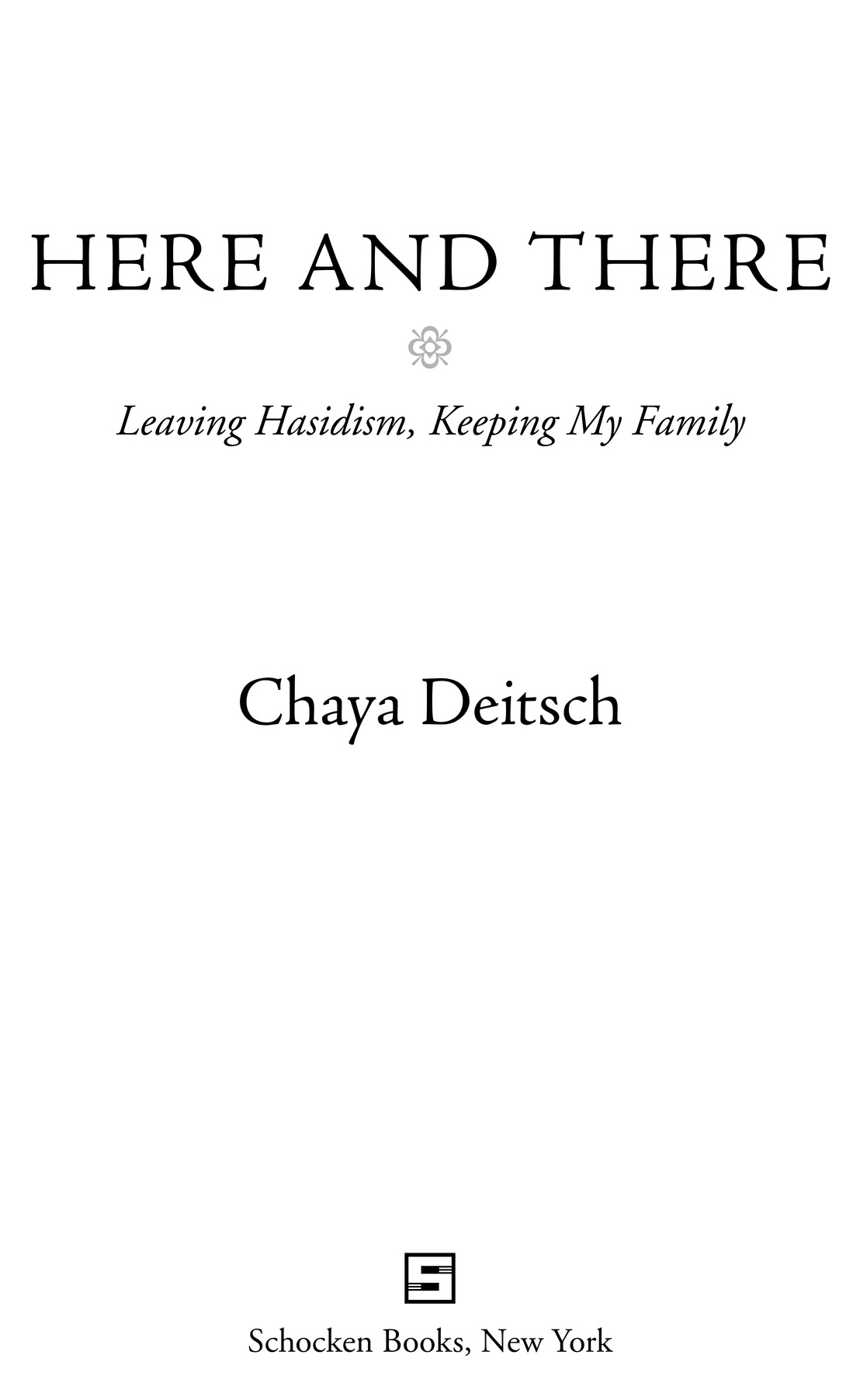This is a work of nonfiction. Nonetheless, some of the names and personal characteristics of the individuals involved have been changed in order to disguise their identities. Any resulting resemblance to persons living or dead is entirely coincidental and unintentional.
All rights reserved. Published in the United States by Schocken Books, a division of Penguin Random House LLC, New York, and distributed in Canada by Random House of Canada, a division of Penguin Random House Ltd., Toronto.
Schocken Books and colophon are registered trademarks of Penguin Random House LLC.
Deitsch, Chaya, author.
Here and there : leaving Hasidism, keeping my family / Chaya Deitsch.
ISBN 978-0-8052-4317-8 (hardcover : alk. paper). ISBN 978-0-8052-4318-5 (eBook).
1. Deitsch, Chaya. 2. Jewish womenConnecticutNew HavenBiography. 3. Habad. I. Title.
F 128.9. J 5 D 45 2015 305.48'8924dc23 2015010023
Introduction
While I had long intended to write about the family I come from, I always assumed I would chronicle the remarkable stories Id grown up hearing: about Russia and World War II, about negotiating the displaced-persons system in Europe (where my grandmother accidentally gave her children their first and only taste of Spam), and about building a life in America as devout disciples of the Lubavitcher Rebbe. My role in this narrative, if any, would be minimal. And so I began my researchgathering notes, taping relatives, reading histories, poring over photo albums, even contemplating a shtetl tour in Ukraine. We are a long-lived bunch, and I had all four grandparents until my late thirties, not to mention aunts, uncles, and family friends, each of whom had something to say.
One afternoon, I took the train into Brooklyn to interview my great-aunt Anya. She is a natural spinner of tales, her observations spiked with an acid sense of humor. (If your husband hates your hat, youve done something right!) But even as she happily held court, she puzzled over my hunger for the details of her life and wondered who would want to read about such terrible times. You will never understand Russia, she said, shaking her finger at me. You will never understand Stalin. You will never understand the mentality. This is a place where a person should not be there.
She was right.
It took several years of writing and rewriting for me finally to acknowledge that something was not working. My attempts to set down my familys history either just lay there limply on the page or panted with clichs about bravery and belief. As Anya had warned, the past was not the place for me. I couldnt bring these tales to life because I had something very different to say. Mine is not a narrative of escape, whether from the shackles of tradition (although I did leave the world in which Id grown up) or the depredations of the gulag. It is, instead, a memoir of staying connected while moving apart, of traveling simultaneously under and within the radar, of stretching without snapping.
I was fortunate in the family into which I had been born. Coddled by two expansive sets of relatives who had safely planted their feet in the nurturing soil of America, I enjoyed a childhood that was secure and loving, if tightly bound by faith and expectations. I grew up in Connecticut with art classes, piano lessons, home-baked cookies, paper dolls, and trips to Miami Beach, but also with gut-busting Shabbos meals, morning prayers, Chanukah gelt, and wondrous tales of miracle-making rabbis, including, of course, the Lubavitcher Rebbe, Menachem Mendel Schneerson, whose portrait hung in my house and in the house of every Lubavitcher I knew. But there were tensions, too. As a young girl, I chafed at my station, silent and invisible, behind the synagogue curtain and dreaded the prospect of an early marriage and a flock of little ones. As a teenager, I drew no strength from the Rebbe or his teachings, or even from more broadly Jewish practices such as keeping kosher or observing the Sabbath. From early on I was headed in another direction, but I still needed my family. A tribesman to the core, I loved my parents, siblings, grandparents, uncles, aunts, and cousins, although I chose to take a very different life path.
So for me there has never been a sharp break with my family and their world, a distinct before and after. By now middle-aged, Ive been secular for nearly twice as long as I was a practicing Hasid. But my back still gets up when well-meaning friends who are familiar with my background make a point of telling me, with conspiratorial condescension, about the black hatters theyve spotted at the doctors or sat next to on a flight to Los Angeles, or the pale, thick-stockinged women they saw shopping for couture at Saks. My first reaction is, Well, why shouldnt they be there? Hasidim have gallbladders, too; theyre allowed to lust after fashion. My second is, Why are you telling me this? These people have nothing to do with me anymore. I recognize the slippery logic of trying to personally disassociate myself from Hasidism even as I insist that its followers are more or less just like everyone else. But I am unable to divide the world into them and everyone else. On Fifth Avenue, a young Lubavitcher, all dark suit, peach fuzz, and religious zeal, scouts for Jews to whom he can give handmade matzo for Passover. I fasten my eyes on the pavement and scurry past him. Along with my embarrassment, however, I feel protective of this sincere teenager and take offense at snipes, especially from other Jews, directed at these earnest street-corner evangelists. And I smile with relief when someone tells me about a nice conversation she had with one of those sweet boys.
My world lacks neat categories, although at first glance the boundaries appear stark. Where would I fit my aunt, when we meet for lunch at her favorite caf in Crown Heights, world headquarters of Lubavitcher Hasidism, and we both start laughing because, fashion-conscious women that we are, were both dressed in head-to-toe black? And where would I place my nephew, tzitzis dangling out onto his pants, rolling his eyes as I lecture him about wasting his brain cells on a new video game? Or my mother, the two of us curled up in her bed on Saturday night after Shabbos, watching Rashomon on public television? Like the Kurosawa film, the only perspective I can attest to is my own. Its this lens, and no one elses, through which I view my past and bear it deliberately, uneasily, but at the same time gratefully forward.
Nisht Ahin und Nisht Aher
Stepping out of the subway, I make my way down Kingston Avenue, the main drag of Crown Heights. The street is bustling on this autumn evening: young couples shop for groceries, teenage yeshiva boys rush to class, gangs of little kids dig into crinkly bags of spicy Bissli, a wildly popular Israeli snack food that falls somewhere between Wheat Thins and Fritos. Most everyone is Lubavitcher, but here and there West Indian men and women are also hurrying, though they will save their errands for their own shops on Nostrand Avenue, three blocks away. Despite the modest skirt and blouse I know to wear, Im too familiar with the code to fool myself into believing that Im passing as a member of this community. Little details of my outfit telegraph outsider: the pointy black flats and the retro-nerdy eyeglasses suggest the East Village, or perhaps one of the hipper parts of Brooklyn.


